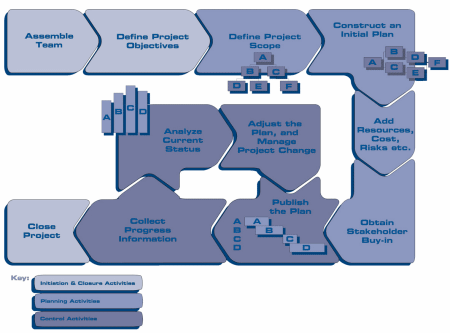Engineered Systems LtdProgramme and Project Management by Ed Johnston |
Mobile +44 (0)7860 663886 |
Programme Management
With many years as a programme and project manager, Ed brings a wealth of experience to the roles, drawn from a wide variety of industries and challenges.
Programme versus Project Management
At what stage does a big Project become a Programme? Often you are considered to be a Programme Manager when you are very senior project managers, working on larger and more complex projects. At some stage, this progresses into working out what projects to run rather than running the projects themselves. This is the entry into Programme Management.
When this happens, the work moves away from the planning, management and guidance of resources into the organisation and constitution of individual projects which will together fulfil a strategic goal. Of course, this can be a major, positive move from one form of work to another, but more often it is a gradual process with blurred lines and retained responsibility for some major pieces of work or indeed whole projects where they are particularly sensitive or high profile.
As with most management situations, first you have to recognise the situation you are in, then the solution is relatively straight forward. Once a Programme is identified, executive management can be engaged to ensure the strategic objectives are clear and confirmed. Then individual projects can be identified, scoped and formed to provide logical, achievable and beneficial elements of delivery which stand on their own feet while moving the Programme towards its strategic objectives.
The gaps between projects can be identified and managed. This is almost as important as the projects themselves, as not everything can be done at the same time and each individual project has to link together to deliver that strategic benefit.
Of course the corporate landscape will grow in proportion to the scale of the objective and achievement, so substantial effort must be put into the co-ordination and communication between each individual executive as well as department or division affected by the programme. Constantly updating understanding of these stakeholders as life and business proceeds, then adjusting the Programme and Projects accordingly while retaining the strategic objectives is what good Programme Management is all about.
Programme Delivery
Then of course there is the nutty issue of delivering the result. There will be times when a good Programme Manager has to step down and deal with Project issues but in the (never to be achieved) ideal world the Programme Manager gets excellent Project Managers and PMO support in place to ensure the details are taken care of by them.
Having got the team in place, the next thing is to guide and motivate them effectively. Good communication of the big picture is essential to motivate project managers that have to work together on a Programme. Without that they will work independently and the gaps and overlaps between projects will increase. Conversely if each PM knows the role they play in delivering the whole Programme it is much more likely that they will feel appreciated for the importance of what they do and recognise when their actions are not aligned with that bigger picture.
During execution, things will go off plan, resources will under-perform, unexpected issues will arise and decisions will have to be made. Robbing Peter to pay Paul can be the only way forward and if this is done with the co-operation of the Project Managers, winners and losers alike, the Programme is much more likely to stay on track.
A Sound PMO
The PMO is the eyes and ears of the Programme. The Programme Manager must have clear, simple and timely information on the progress of projects against the overall programme plan in order to finesse the resources available to keep the Programme on track
The PMOO also has an important role as the Project Police: ensuring standards are met, reports are submitted, plans are maintained and so forth. Some PMs are better at hygiene factors than others, and the amount of hands-on assistance by the PMO will vary accordingly, but the PMO is there to guide and steer, not relieve the PM of their responsibilities.
The Result
A quite life for the Programme Manager while their excellent PMO and Project Managers seamlessly deliver excellent output to time, cost and quality? Well in some parallel universe maybe.
No, the Programme will exist within a business context. That means emphasis on objectives change, business can grow or shrink, acquisitions and divestments can happen. That is before we throw in the human factor of individual executives and stakeholders personalities having an influence and occasionally being promoted or replaced in their posts. All these factors need to be taken into account throughout the Programme, understanding their impact and adjusting plans and projects accordingly.
Provided of course that this does not compromise the original strategic objectives. If this ever happens, these objectives must be confirmed or updated and a major re-planning and re-shaping is required.
If the Programme Manager is able to understand and reconcile the motivations of the individual stakeholders, to ensure the Programme can flex and adapt as these change while retaining their strategic outcome, then the Programme will be a great success.
